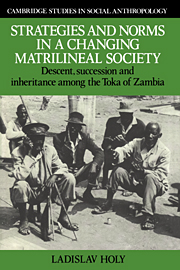 Strategies and Norms in a Changing Matrilineal Society
Strategies and Norms in a Changing Matrilineal Society Book contents
- Frontmatter
- Contents
- List of maps and diagrams
- List of tables
- Acknowledgements
- Introduction
- 1 Descent categories and local ties in traditional Toka society
- 2 Technological development and the restructuring of the relations of production
- 3 Changing norms of inheritance
- 4 The structure of local groups
- 5 The changing concept of the basimukowa
- 6 Mukowa and ritual
- 7 The role of the mukowa in succession
- 8 The role of the mukowa in inheritance
- 9 Mukowa: representational and operational models
- 10 Norms as a strategic resource
- Appendix 1 Village fission in Guta
- Appendix 2 Aspects of individual mobility in Ngwezi
- Notes
- References
- Index
- Cambridge Studies in Social Anthropology
8 - The role of the mukowa in inheritance
Published online by Cambridge University Press: 25 August 2009
- Frontmatter
- Contents
- List of maps and diagrams
- List of tables
- Acknowledgements
- Introduction
- 1 Descent categories and local ties in traditional Toka society
- 2 Technological development and the restructuring of the relations of production
- 3 Changing norms of inheritance
- 4 The structure of local groups
- 5 The changing concept of the basimukowa
- 6 Mukowa and ritual
- 7 The role of the mukowa in succession
- 8 The role of the mukowa in inheritance
- 9 Mukowa: representational and operational models
- 10 Norms as a strategic resource
- Appendix 1 Village fission in Guta
- Appendix 2 Aspects of individual mobility in Ngwezi
- Notes
- References
- Index
- Cambridge Studies in Social Anthropology
Summary
The division of the deceased's estate among his basimukowa is the last stage of the mourning ceremony. If the ceremony starts on a Saturday night, the division of the estate takes place on the Monday morning, when all the movable property of the deceased is assembled in front of his house. Until then the spouse or the son of the deceased acts as the guardian of the property. The guardian always has to be present at the division of the deceased's estate for he or she knows which cattle in the kraal belong to the deceased, to whom he has loaned cattle, and where he has claims on other people's property. Before the estate of a deceased man is divided, whichever of the deceased's basimukowa chaired the meeting for choosing the successor, and later played the prominent role in his installation, asks the widow, her children and possibly some of her near kin, about the debts of the deceased, his cattle, cash which was in the house when he died, and about the bridewealth received for his married daughters and the way in which it was disposed of. Inquiries are made as to whether all the things left behind by the deceased have been declared by the guardian of his property, whether the things assembled in front of his house represent all his personal and household effects, and whether any of them do not in fact belong to someone else.
- Type
- Chapter
- Information
- Strategies and Norms in a Changing Matrilineal SocietyDescent, Succession and Inheritance among the Toka of Zambia, pp. 172 - 190Publisher: Cambridge University PressPrint publication year: 1986
